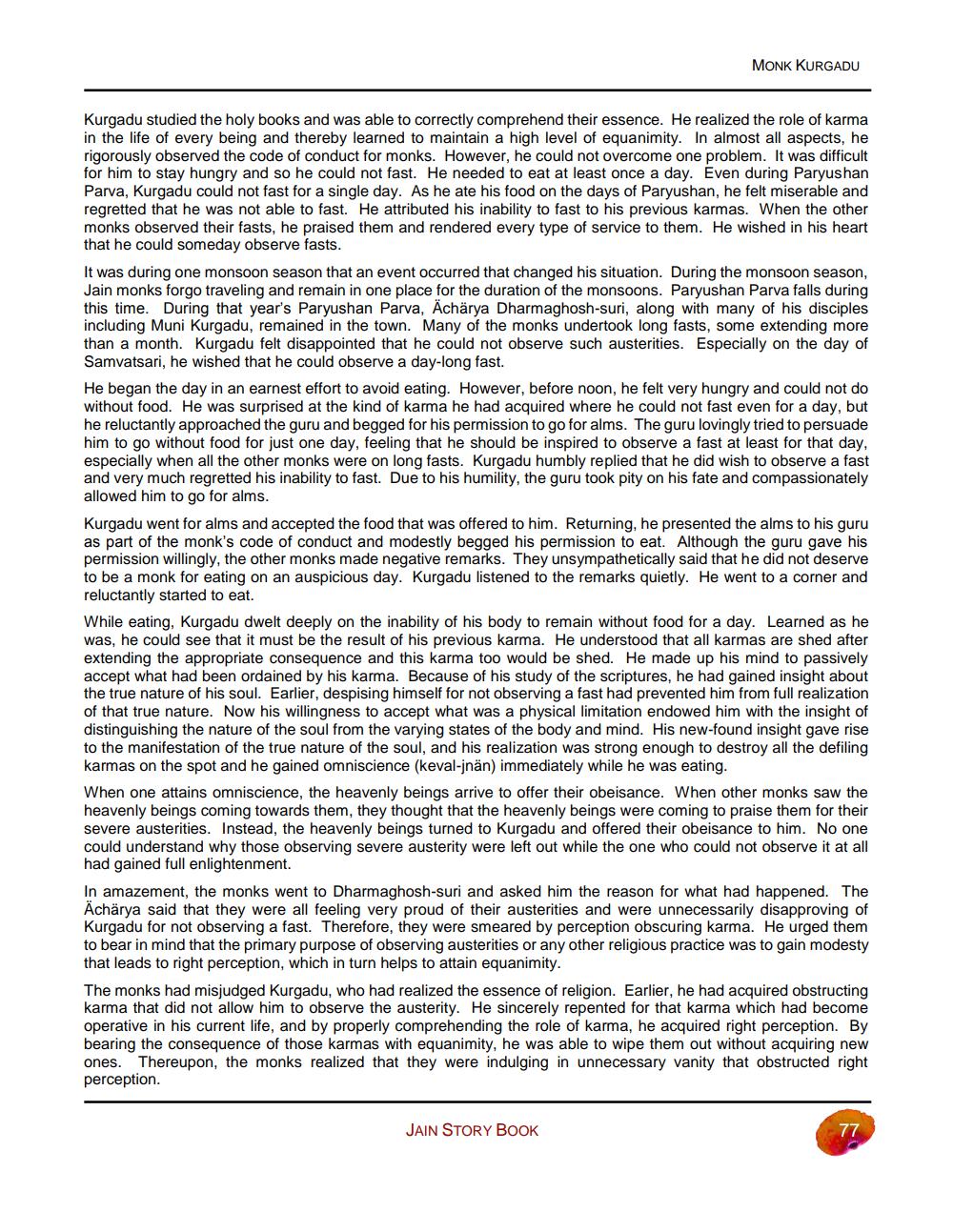________________
MONK KURGADU
Kurgadu studied the holy books and was able to correctly comprehend their essence. He realized the role of karma in the life of every being and thereby learned to maintain a high level of equanimity. In almost all aspects, he rigorously observed the code of conduct for monks. However, he could not overcome one problem. It was difficult for him to stay hungry and so he could not fast. He needed to eat at least once a day. Even during Paryushan Parva, Kurgadu could not fast for a single day. As he ate his food on the days of Paryushan, he felt miserable and regretted that he was not able to fast. He attributed his inability to fast to his previous karmas. When the other monks observed their fasts, he praised them and rendered every type of service to them. He wished in his heart that he could someday observe fasts. It was during one monsoon season that an event occurred that changed his situation. During the monsoon season, Jain monks forgo traveling and remain in one place for the duration of the monsoons. Paryushan Parva falls during this time. During that year's Paryushan Parva, Acharya Dharmaghosh-suri, along with many of his disciples including Muni Kurgadu, remained in the town. Many of the monks undertook long fasts, some extending more than a month. Kurgadu felt disappointed that he could not observe such austerities. Especially on the day of Samvatsari, he wished that he could observe a day-long fast. He began the day in an earnest effort to avoid eating. However, before noon, he felt very hungry and could not do without food. He was surprised at the kind of karma he had acquired where he could not fast even for a day, but he reluctantly approached the guru and begged for his permission to go for alms. The guru lovingly tried to persuade him to go without food for just one day, feeling that he should be inspired to observe a fast at least for that day, especially when all the other monks were on long fasts. Kurgadu humbly replied that he did wish to observe a fast and very much regretted his inability to fast. Due to his humility, the guru took pity on his fate and compassionately allowed him to go for alms. Kurgadu went for alms and accepted the food that was offered to him. Returning, he presented the alms to his guru as part of the monk's code of conduct and modestly begged his permission to eat. Although the guru gave his permission willingly, the other monks made negative remarks. They unsympathetically said that he did not deserve to be a monk for eating on an auspicious day. Kurgadu listened to the remarks quietly. He went to a corner and reluctantly started to eat. While eating, Kurgadu dwelt deeply on the inability of his body to remain without food for a day. Learned as he was, he could see that it must be the result of his previous karma. He understood that all karmas are shed after extending the appropriate consequence and this karma too would be shed. He made up his mind to passively accept what had been ordained by his karma. Because of his study of the scriptures, he had gained insight about the true nature of his soul. Earlier, despising himself for not observing a fast had prevented him from full realization of that true nature. Now his willingness to accept what was a physical limitation endowed him with the insight of distinguishing the nature of the soul from the varying states of the body and mind. His new-found insight gave rise to the manifestation of the true nature of the soul, and his realization was strong enough to destroy all the defiling karmas on the spot and he gained omniscience (keval-jnän) immediately while he was eating. When one attains omniscience, the heavenly beings arrive to offer their obeisance. When other monks saw the heavenly beings coming towards them, they thought that the heavenly beings were coming to praise them for their severe austerities. Instead, the heavenly beings turned to Kurgadu and offered their obeisance to him. No one could understand why those observing severe austerity were left out while the one who could not observe it at all had gained full enlightenment. In amazement, the monks went to Dharmaghosh-suri and asked him the reason for what had happened. The Achärya said that they were all feeling very proud of their austerities and were unnecessarily disapproving of Kurgadu for not observing a fast. Therefore, they were smeared by perception obscuring karma. He urged them to bear in mind that the primary purpose of observing austerities or any other religious practice was to gain modesty that leads to right perception, which in turn helps to attain equanimity. The monks had misjudged Kurgadu, who had realized the essence of religion. Earlier, he had acquired obstructing karma that did not allow him to observe the austerity. He sincerely repented for that karma which had become operative in his current life, and by properly comprehending the role of karma, he acquired right perception. By bearing the consequence of those karmas with equanimity, he was able to wipe them out without acquiring new ones. Thereupon, the monks realized that they were indulging in unnecessary vanity that obstructed right perception.
JAIN STORY BOOK




